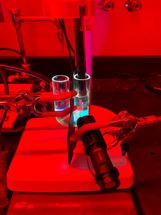Oxford Instruments announces major technology licensing deal with GE Healthcare
Result will be powerful new tool for in vitro molecular analysis
Oxford Instruments Superconductivity (OIS) announced an agreement whereby GE Healthcare will exclusively licence in vitro rights to its proprietary dynamic nuclear polarization (DNP) technology to OIS for the creation of the world's first DNP Nuclear Magnetic Resonance (NMR) instrument. DNP-NMR has been lab proven through extensive testing by GE Healthcare and will offer researchers a groundbreaking approach to in vitro molecular analysis. Conventional NMR, although an information rich technique, has always been limited by a lack of sensitivity, causing researchers to find alternative, and often complex and expensive ways of addressing this problem.
This new technique will create several orders of magnitude increase in sensitivity compared to existing NMR, enabling new applications to be studied within research fields such as drug discovery and development, including drug library profiling, combinatorial chemistry and pharmacogenomic studies. Under the terms of the agreement OIS will undertake the development, manufacture and commercialisation of the technology, while GE Healthcare will supply the proprietary reagents that are central to the technique.
According to OIS Marketing Director, Frank Trundle, "This is a really significant deal for us that will provide OIS with critical intellectual property and know-how. Combined with our tremendous expertise in cryogenic and magnetic technologies, central to DNP-NMR, this provides us with a sound base to develop the technique for commercial use. Due to the high sensitivity that this technique affords we see these instruments providing some of the information richness of conventional NMR whilst moving closer to the sensitivity of some mass spectrometry techniques. This will help open up new avenues for NMR based molecular analysis.
DNP-NMR requires a novel sample preparation method that requires free radical tags. In combination with low temperatures and high magnetic fields, a significantly improved signal to noise ratio is obtained for NMR spectroscopy. NMR is an information-rich analytical technique used in a wide range of research disciplines, particularly in biochemistry, for the analysis of chemical structures and molecular confirmation. NMR is, however, limited by a relative insensitivity to certain nuclei, such as carbon-13 and nitrogen-15, which can provide important information about the structure of a molecule. DNP-NMR addresses directly this insensitivity.
Other news from the department research and development
Most read news
More news from our other portals
See the theme worlds for related content
Topic World Mass Spectrometry
Mass spectrometry enables us to detect and identify molecules and reveal their structure. Whether in chemistry, biochemistry or forensics - mass spectrometry opens up unexpected insights into the composition of our world. Immerse yourself in the fascinating world of mass spectrometry!

Topic World Mass Spectrometry
Mass spectrometry enables us to detect and identify molecules and reveal their structure. Whether in chemistry, biochemistry or forensics - mass spectrometry opens up unexpected insights into the composition of our world. Immerse yourself in the fascinating world of mass spectrometry!





























































